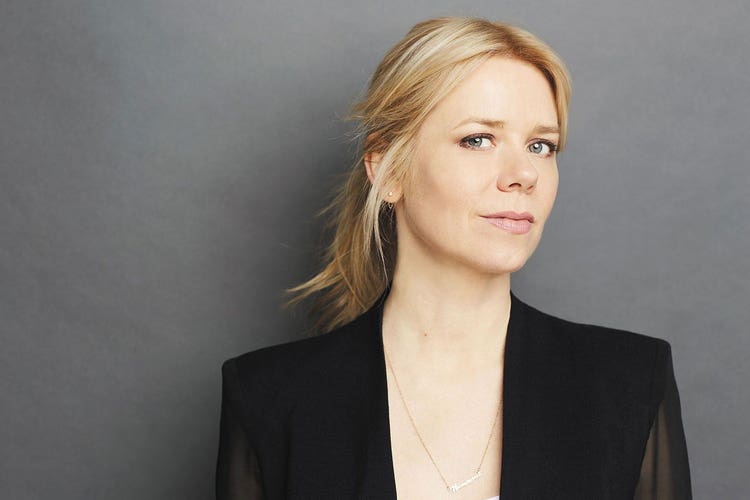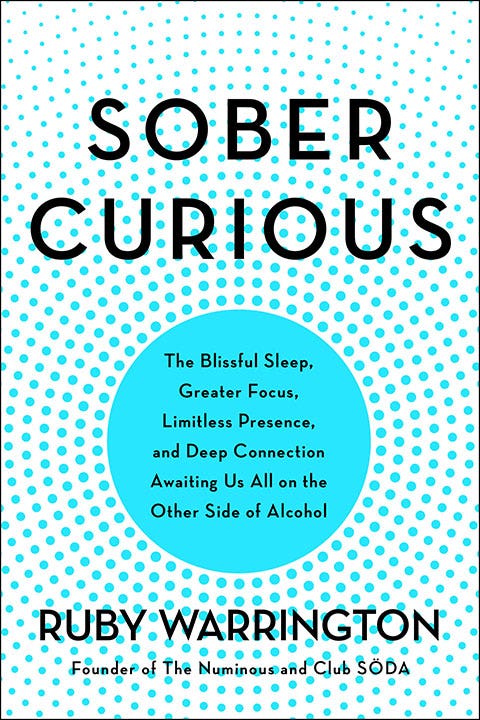Ruby Warrington Wants You to Get Lit on Your Own Vibe

Ruby Warrington, lifestyle journalist and creator of The Numinous, a site dedicated to conscious living, is known for challenging cultural norms and expectations. Her first best-seller, “Material Girl, Mystical World” (HarperOne, third printing May 2017), answers the question whether it’s possible to be spiritually aware and still appreciate—even enjoy—a fantastic pair of shoes.
Just in time for the season of intention and resolution, Warrington is tackling a subject that many of us struggle to answer or even refuse to take on: life without alcohol. We might consider ourselves “social” drinkers or imbibe only once or twice a year, but could we possibly do without it at all? What does that mean for our relationships? It’s the subject of her second book, “Sober Curious: The Blissful Sleep, Greater Focus, Limitless Presence, and Deeper Connection Awaiting Us All on the Other Side of Alcohol” (HarperOne, December 2018). We recently caught up with her to find out more.

24Life: Writing your new book was a journey to answer this question: In a world where we eat well, we exercise, we meditate—why do we still drink? What led you to this inquiry?
Ruby Warrington: A lot of people think it was about personal recovery. “Sober Curious” is not about recovery. It is about finding your own path to a healthier relationship with alcohol, yourself and the world around you—and radically transforming every area of your life. I wanted that fuller, more alive experience for myself, for my life. Surprisingly, I discovered that I was not alone in my quest. Many others in the community were seeking a different solution, and yet there were few resources beyond Alcoholics Anonymous, which insists that you first call yourself an alcoholic and then commit to absolute abstinence. I appreciate how AA has helped countless people reclaim their lives from alcohol addiction, and yet it was not the right fit for me and led me to a deeper exploration and more questions. Basically, I became “sober curious.”

24Life: What are some of the questions you were asking?
RW: Why is alcohol so accepted, everywhere? Why are the only people who don’t drink, the ones who can’t? Why do other substances have such a stigma, but alcohol does not? Can I be a little bit addicted? Can I be myself if I don’t drink in a social setting? I started exploring this among a community I founded called Club Soda NYC—a community and a safe social space for people to ask and explore their sober curious questions in open, alcohol-free, fun forums. These events draw thousands of participants who see freeing themselves of alcohol dependency as the new health frontier.

24Life: What is behind our cultural fascination with alcohol? Even as teenagers, we’re waiting to escape the rules, be free and uninhibited—to finally achieve that milestone of being “legal.”
RW: Alcohol is intrinsic to American culture, from kegs at college parties and cocktails after work to wine at book club groups and beer at the stadium. Most of us who drink do so mindlessly: One glass of wine turns into two, which turns into a bottle. We may not have a problem with alcohol, but our drinking habits are contradictory to the healthful behaviors we cultivate, from choosing a plant-based diet to exercising and meditating. The question to ask is how different would your life be if you stopped drinking on autopilot—or for some, if you stopped drinking altogether?

24Life: What did you discover about yourself?
RW: I realized how alcohol is a weak imitation of joy, inspiration, confidence, connection and an overall sense of aliveness, something that is uniquely ours and that is cosmically generated from within. I learned how to disrupt the myths and beliefs I had created for myself and to get through a number of “sober firsts.” I gained courage and empowerment that come from learning to navigate the diverse obstacles and pressures of our drinking culture. On the other side of that, I got a glimpse of the well-being that is available when I gave up drinking.
It was a journey, and along the way, I learned how to find community, how to overcome FOMA—fear of missing alcohol. How to commit to my well-being, how to build stronger relationships and forge friendships, how to trust my mental fortitude and intrinsically balance my emotions without an extrinsic substance. I discovered not only my innate confidence but [also] my inspired self and a belief in my ability to contribute something valuable to the world.
24Life: Is this a path for someone who is addicted?
RW: If you or someone you know is addicted to alcohol or to anything, seek professional help and do it right away. I think the fact that AA offers unlimited, free, peer-to-peer counseling and support for people struggling with addiction is an amazing thing. There needs to be more of this in every area of life. Get support. And I believe that anyone who drinks on a regular basis is a little addicted to alcohol. Our brains are biologically hard-wired to form an attachment to alcohol. It is one of the five most addictive substances and is marketed to us from every angle from a very young age. It is important to recognize how drinking can become habitual—and in recognizing this, we can begin to address some of the stigma that surrounds the subject of alcoholism, in turn making it less shameful so that we can begin questioning our relationships to alcohol.

24Life: Where and how do we start, for those of us who want to be sober curious?
RW: Feel the FOMA and do it anyway! Most people drink alcohol to feel more confident and relaxed in social situations. (That raises a question: Why does socializing make us nervous and tense?) In social situations, FOMA is most prevalent. If we teach our brains that we need alcohol to socialize, the thought of having to perform without our trusty liquid crutch can bring up a lot of fear. Since the fastest way to dismantle your fears is to prove them wrong, I recommend embracing as many sober firsts (staying sober in situations where you would normally drink) as you can. It may take a few tries, but you’ll soon realize you don’t need alcohol at all—not to mention, you will discover which social situations you should simply skip.
24Life: What are some of the biggest hurdles that we can expect to encounter as we become sober curious?
RW: At first, I was concerned about my relationship with my husband. We’d always had so much fun drinking together, and I was worried about it driving a wedge between us or that we would have nothing to talk about. The role of alcohol in your relationships may be what gives you the most fear at first, but trust that as you are fully present with your relationships, you will experience a new level of emotional intimacy. For women, I also believe that choosing to not drink is a pathway forward. Too many stories of booze-sodden “me too” experiences remind us that we must reclaim a new emancipated experience of being clear and in full command of our bodies and our consciousness so that we can step into our power.

24Life: Do you recommend that we drink, ever? What about celebrations?
RW: It’s a completely individual decision. I am not 100 percent abstinent, but I have essentially reclassified alcohol as a class A substance for myself. This, coupled with embracing years of sober first and answering all my own sober curious questions with integrity, means the situations where alcohol feels like an appropriate substance are becoming fewer and farther between. Having discovered how it feels to get naturally high, I no longer enjoy the numbing buzz of a drink. It feels so two-dimensional, not to mention it comes with such a high emotional price! All this means for me is that a positive drinking experience these days is most likely to be one that reminds me why I don’t drink. Each “reminder” (what they might call a relapse in AA) makes it easier and easier for me to choose not to use booze.

“Sober Curious” is available at booksellers everywhere. Find more of Ruby Warrington’s high- vibe insights and inspiration at The Numinous and consider joining her for a Curious Sober Retreat.
Video credit: Mark Kuroda, kurodastudios.com
Photo credit: Caitlin Mitchell; Courtesy HarperOne; Ruvan Wijesooriya; Mark Kuroda, kurodastudios.com; Michael Discenza, Unsplash; Andreas Ronningen, Unsplash; Ruvan Wijesooriya